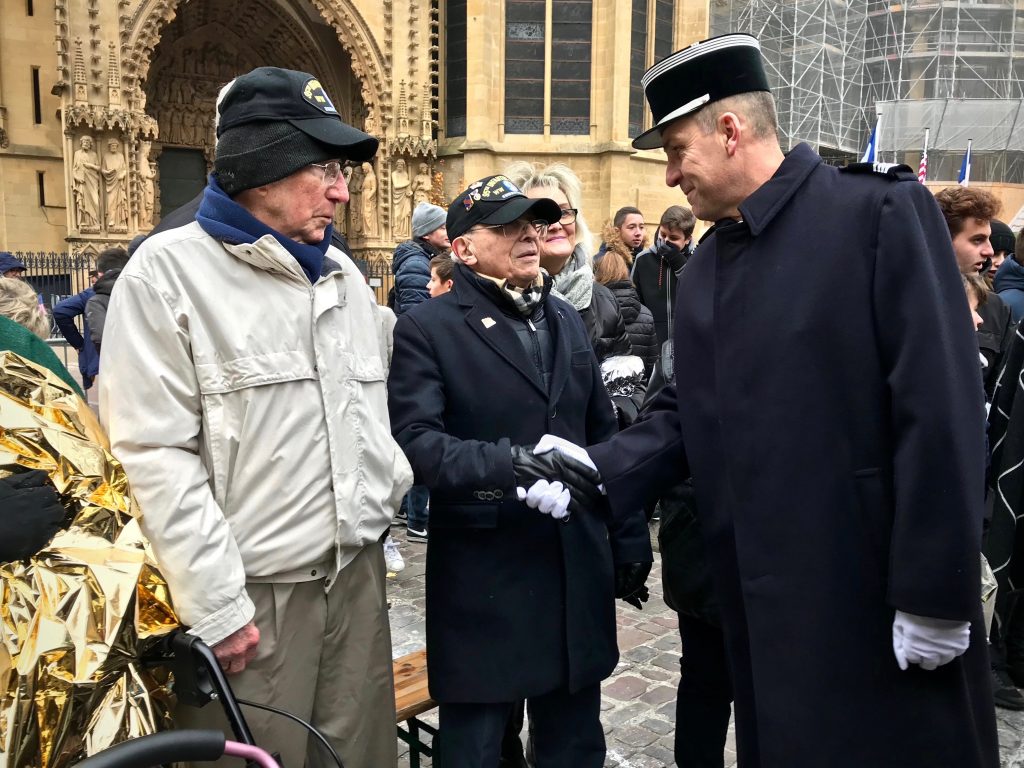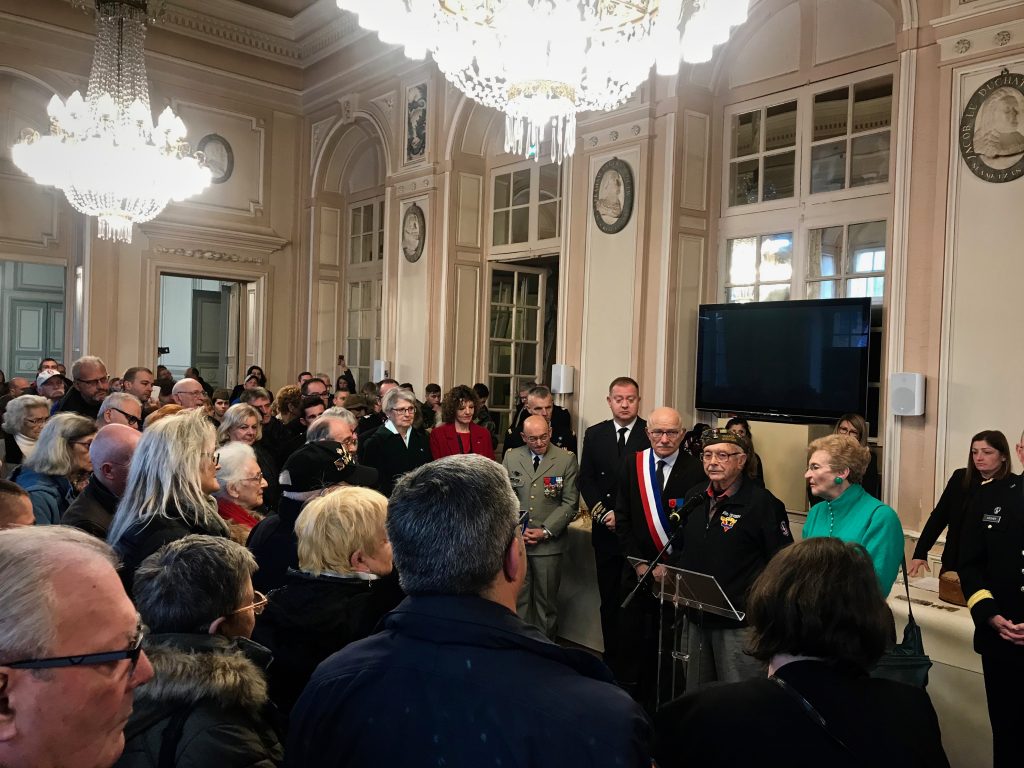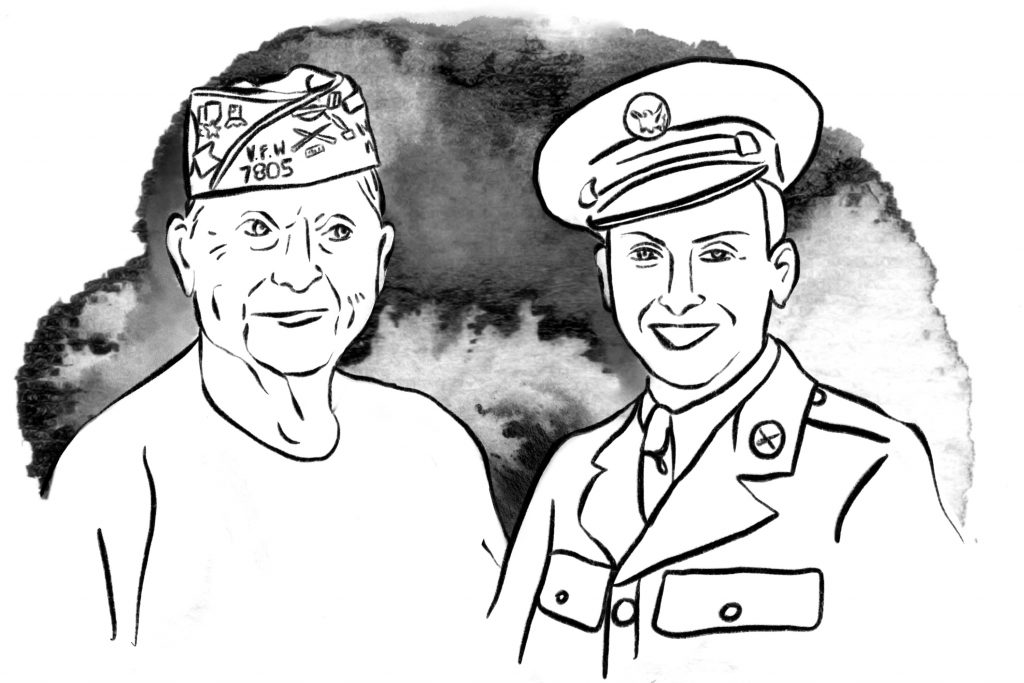
Finding where exactly their war ended was no simple task for Ceo Bauer and Steve Bodnar. They first returned in 1985 to Maizières-lès-Metz, the small town in northeastern France, that they had helped liberate. Bauer was blown up in that battle and Bodnar was shot and would eventually lose a leg. The two had been foxhole buddies and became friends after the war.
Bauer was now 61 and Bodnar 59, and their working days were mostly behind them. They had time to travel, and so it was that their travels brought them to Lorraine.
France had changed a lot, and memory does not always serve. The two men could not simply hop in a car and navigate to where they’d been wounded. So Bodnar wrote the tourism office in Metz—Lorraine’s largest city, just south of Maizières—explaining who he was and what he and an old war buddy were after, and that he’d be grateful for whatever help the tourism office could provide. A few weeks later Bodnar received a return envelope stuffed with hotel and restaurant lists and advertisements for local attractions, the miscellany a tourism office would send anyone. Bodner was not happy. He replied tersely: For all he’d sacrificed—a leg, literally—he’d expected a lot more than brochures.
This time a young clerk, Jean Luc Baudinet, responded personally. He knew the local history of the war well, he wrote, and it would be his honor to accompany the men to Maizières himself.
Maizières-lès-Metz is a small factory town, separated from Metz by rolling fields and industrial parks. In 1944, German encampments in Maizières stood between George Patton’s Third Army and Metz, a key objective on the road to Germany’s resource-rich Saar region. For months, Patton’s troops had struggled in Lorraine to little avail, with fuel and ammunition in short supply. The residential section of Maizières fell, in ruins, to the Americans in October. But German troops remained entrenched in a wooded estate south of town, centered around a stout country house called the Chateau Brieux. To open the road to Metz, the estate would need clearing, and it was Bauer’s and Bodnar’s unit that was put to the task—I Company, of the 377th Infantry Regiment, of the 95th Infantry Division.
Orders were to assault the Chateau Brieux on the night of November 8. This seemed, to the soldiers, a bad idea. The 95th had arrived to the front-line only days earlier and, at this point in the war, was all but untested in battle. I company, specifically, hadn’t attacked in the daylight, let alone by night, in darkness so black that soldiers had to tie white sheets to their arms to see each other. Days of pouring rain had left already unfamiliar terrain, pocked with shell craters, slippery and difficult to maneuver. But a request to delay the assault until daytime was denied.
“Patton wanted action now,” Bodnar wrote in a personal account of the battle. “He got it, and [we] paid the price.” The assault was a bloodbath. Rifle and machine gun fire hit the GIs from all sides, and artillery shells, mortars, and mines detonated as if in unison. The men lost track of each other and as some were wounded could only assess their damage by the fleeting light of flares. Bodnar took machine gun fire to the leg. Minutes later, Bauer was hit by an explosion—he thinks it was a mine—that killed two others beside him. They called out for medics, but none responded, so both men were left to crawl and stumble the long way back to town. The assault failed. But the chateau fell when I Company attacked again the following afternoon.
Now, forty years later, Baudinet and Roger Goergen, a colleague with stronger English, showed Bauer and Bodnar a vastly transformed Maizières. The town had grown out to the site of the assault, with homes, apartment buildings, and a school all nearby. Of the Chateau Brieux, only a few crumbled sections of courtyard wall remained. And the estate had been turned into a park, full of dogwoods, weeping willows, ponds, and a playground.
Back home Bauer and Bodnar raved about their trip to fellow I Company veterans. Two years later, in 1987, they went back, this time in a group of five. On the banks of Moselle River—which snakes northwest through Lorraine, past Luxembourg, and into Germany—they chanced upon a retired French colonel walking his dog. Discovering who the men were, the colonel excitedly led them into town to meet a retired general, who likewise received the men with chatty enthusiasm. It was funny, Bauer thought: The 95th had liberated a lot of towns and cities—439 in all, over the course of the war, in less than a year. The soldiers were often in-and-out, always on to the next town, with scant thought of what lied behind them. Yet here the veterans were, in just one town, greeted as celebrities.
In 1989, a dozen veterans returned, this time by invitation. Metz was holding a ceremony commemorating the 45th anniversary of its liberation. By now the trips had taken on a familiarity for Bauer who feared he and Bodnar might be in for a waste of time: Neither was disposed to sentimentality, so what were they likely to get that they hadn’t gotten twice before already?
Instead, Bauer was amazed. Just outside the Metz city center, at the base of towering ramparts dating to the 1700s he saw a newly erected monument to the 95th: a tall sculpture of a bald eagle cut from white stone. The mayor spoke before a large crowd, thanking the veterans. And a US Army band from a base in Germany played “The Star-Spangled Banner,” answered loudly by a French Army band with “La Marseillaise.”
“It was,” Bauer would later say, “beyond any of our expectations.”
The veterans paraded a mile to the Metz city square, with military reenactors clad in full GI uniforms stopping traffic to make way. The square was filled with thousands of people who cheered and clapped and waved and sang “La Marseillaise” over and over and over again. It was as if the entire city had been waiting for this moment, and for these men.
And that, in itself, defied logic. The men and women of Metz who were old enough to remember the day of their liberation were themselves now decades older. Many who were there that day had since died. But now the streets were filled with people who had no memory of or direct connection to the war, to the years of German occupation, and to the arrival of the men of the 95th.
All of which suggested that such celebrations would have ended decades ago. In many places they had.
But, for reasons not immediately apparent, not in Metz.
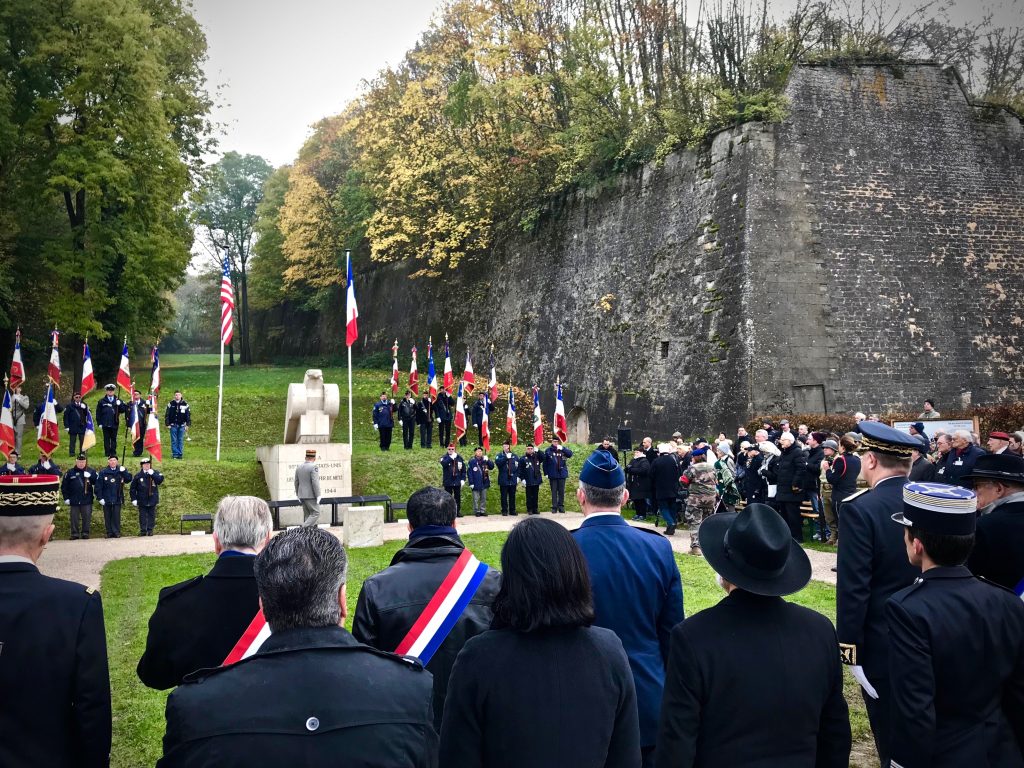
*
On a drizzly November morning in 2019, Ceo Bauer stood again at the site of the Chateau Brieux. He was now 96. He was slower but sturdy. He wore prodigious square-frame glasses, a 95th Infantry Division ballcap, a black 95th Infantry Division jacket, and a 95th Infantry Division pin on his shirt’s breast pocket.
Hundreds of townspeople were gathered there, bundled against the cold in kaleidoscope colors. Members of local civic groups—including various French veterans’ groups—clustered in loose formation, donning uniform blue jackets and berets. A cadre of firefighters wore gleaming bronze helmets. Dozens of school children waved tiny French and American flags, while still more kids crowded the fence of an adjacent school, all craning for a view of the goings on.
Every five years since the Metz ceremony in 1989, veterans of the 95th had returned to Lorraine, where over the course of a week towns and cities commemorated the region’s liberation. They were joined by dozens and relatives and friends, so many that now they filled two tour buses. In past celebrations dozens of veterans made the trip. But now, for the 75th anniversary, there were only three: Ceo Bauer, Tony Duno, who was 94, and Frank Taylor, who would arrive later that day. Another veteran, Steve Jamison, was on a concurrent trip to northern Thionville and throughout the week would occasionally join the larger 95th group. And one veteran’s widow, 92-year-old Jerry Jefferson, was there with her children and grandson.
It was, almost certainly, the last of the ceremonies like these for which the veterans themselves would be present.
A horn played, and the civic groups hoisted tall French flags, all fringed with gold. At a microphone, Maizières’s young mayor welcomed the Americans. “I’m moved to declare this is a French city of Lorraine,” he said. “We’re honored to welcome our liberators.”
The ceremony was about ready to move on from the speeches when David Meyer, whose late father had served in the 95th, called out, “Let Ceo talk!” People laughed.
“You get around these military types, everyone’s so shy,” Meyer whispered to those around him, smiling. “Nobody wants to interrupt the program, but that was the moment.”
Bauer approached the microphone. He used a walker that he did not lean on but carried in front of him, as if he found little use for it.
“I’ll take my time,” he began, prompting more laughter. Bauer was known to be a talker and this was his moment. “I was severely wounded, literally right here.” A French woman translated, sometimes struggling to keep pace with Bauer’s gravelly pronouncements. “Every man in our eleven-man squad was killed or wounded. Every man.” He took care to name the men killed in the explosion that wounded him: Harold Kellogg and John Ahern. Then, he said, “I am HERE for AmerICA,” he said. “I am here For FRANCE. … I am here for huMANITY.”
When he was done telling the story of the 95th he called out, “Viva La FRANCE, and long live the USA.”
National anthems played, and a teacher slapped at two French boys who had continued talking. Tony Duno, thin and dressed in a heavy pea coat and Burberry-patterned sweater, struggled as he stood from a wheelchair to salute the flags. His family urged him to sit, but Duno stood until the last notes.
People packed around the veterans to thank them and shake their hands. Children eyed the veterans almost suspiciously, their gazes lingering and registering something like disbelief. Bauer, every bit the ham, reveled in the attention: “I tell them, ‘Yeah, I’m real!’” he said, laughing. “Viva la France, long live the USA,” he chirped to no one in particular as he made his way slowly but surely through the crowd, like a tortoise. “Viva la France, long live the USA.”
Some in the crowd had gotten to know the veterans over the years and approached them like old friends. Among them was Alain Bertolotti, a 34-year-old delivery driver from nearby Mirange-Silvange. Bertolotti was nine when he first met the veterans at the 50th anniversary ceremonies in 1994. There were many veterans then, aging but still spry. Until then, American GIs had been only the stuff of comic book legend. “I finally put an image on everything I had been told,” Bertolotti said. “I remember my first reaction: ‘Wow.’” He recalled Bauer and Bodnar, in particular: Bauer seemed always to be talking, and Bodnar always telling his friend to shut up.
Bertolotti’s father had invited some of the veterans home for a meal that year. Bertolotti spoke little English then and understood little of the conversation. But as he sat in awe of the veterans, he resolved to improve his English and stay in touch with these men. And he did, by phone and email. When he was 15, in 2000, he visited the States for a month, staying with several veterans, including with Bodnar in central Texas. The two stayed up late at night, with Bodnar doing most of the talking from a rocking chair and Bertolotti laid out on the thick carpet drinking in his words. Bodnar, who died in 2018, gave him his dog tags, which Bertolotti keeps framed in his home.
This year, it was Bertolotti’s turn to extend an invitation. He had become close with the Duno family, and when the ceremony ended he hosted Duno, Duno’s two daughters, and their husbands for lunch. Over osso buco, they swapped stories in a mash of English, French, and German. (Duno, after World War II, remained in Germany as an MP and married a German woman, so his daughters, Nancy and Patricia, grew up speaking both English and German.) “It was a magical moment for all of us,” Bertolotti said of a moment he had almost had to miss.
Bertolotti had months earlier asked his boss for the day off. But two weeks before the ceremony his boss refused him; there were simply too many shipments to get out. Bertolotti pleaded, but his boss was firm. So Bertolotti quit.
As a father of three—with kids aged nine, seven, and two—this was no small thing. Duno’s family marveled at his sacrifice. Bertolotti brushed off their concern: It was the veterans who had sacrificed.
“Why would you do this?” Bertolotti’s boss had challenged him. “They aren’t your family!”
Bertolotti told him, “In 1944, this was not their country.”
There was a time when it was not France’s either.
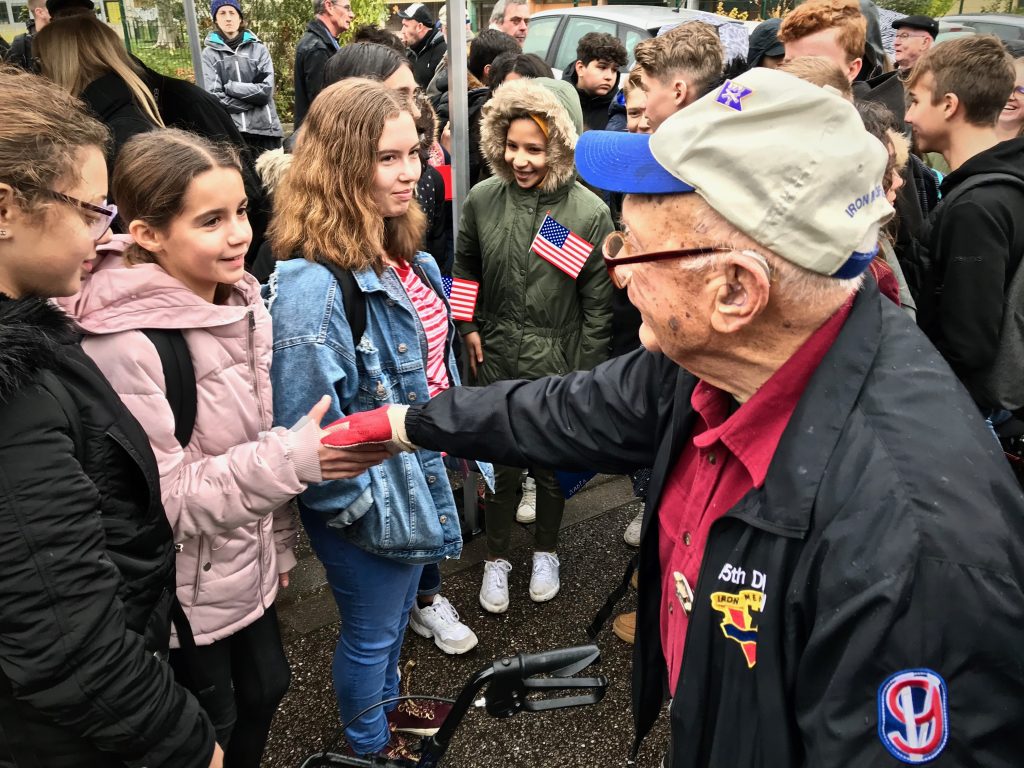
*
Lorraine and its neighboring region to the south, Alsace, changed hands between France and Germany four times between 1871 and 1944. Metz is the sort of little-big town that is actually a city that on a European vacation you might breeze through in a day or less with a nagging sense that you’re missing something.
The push-and-pull between France and Germany shows in Metz’s architecture, where ornate French-classical construction meets imposing German Imperialist structures, including an impressive rail station, and where art deco meets mock-Bavarian design. Even before war left the regions up for grabs, Lorraine and Alsace exhibited a kind of “double culture,” historians say, in which national sentiment tended towards France but customs and often language reflected roots in Germany.
Lorrainers and Alsatians drafted into the Imperial German Army during World War I typically regarded their task with disdain, or at least ambivalence. When the victorious French Army marched back into the region in 1918 it was greeted with exhilaration. That lasted until 1940, when France fell to Nazi Germany in six weeks. For Lorrainers and Alsatians to lose their nationality was devastating. What’s more, while much of France eventually fell under Nazi occupation Lorraine and Alsace were annexed into the Third Reich.
This triggered one of the largest mass exoduses in European history. Francophiles, Jews, trade unionists, and all real or perceived enemies of the Reich were unwelcome. Some fled, but many more were driven out. The sick, the very elderly, and women on the verge of childbirth were targeted for expulsion. Whole villages were emptied, sometimes with only an hour’s notice.
Those who remained, in the meantime, were greeted as Germany’s erstwhile and dearly missed children. They were granted every freedom of a German citizen but subjected to an extreme program of what the native-Alsatian and writer Maurice Zuber called “denationalization.” “The process goes on constantly through propaganda in the newspapers, over the radio and at mass meetings for the ‘recovered brethren,’ by parades, by spying and betrayals, by persecutions, and by suppression of every detail that is French or might convey any French idea or memory,” he wrote in Foreign Affairs in 1942. The French language was banned outright. Monuments to France’s dead in the War of 1870 and World War I were demolished. Even individuals’ names were changed or translated: Inès to Agnes, Jacques to Jakob.
Some collaborated with the Nazis. Others accepted what did not too-badly affect them. But the people of Lorraine and Alsace mostly hated being German. Their resistance showed in sabotage and small acts of anonymous protest. “Propaganda posters are always torn down,” Zuber wrote. “A snatch of the ‘Marseillaise’ is suddenly heard in moving picture theaters or whistled at night in front of the Party meeting-places.”
Hitler, believing Metz strategically important, had ordered his army to hold the city to the last man. So it was that in 1944, with the allies advancing from their Normandy beachhead, the fight into the city was brutal. Metz and its surrounding hillsides were flush with heavy forts and pillboxes—not to mention the city’s many centuries-old fortress walls and casemates. What’s more, supply chain problems in Third Army, after Patton’s historic dash across France in August 1944, gave Germans troops months to haul in reinforcements and organize for Metz’s defense.
The 95th—some 14,000 men strong—crossed the English Channel in September. With little battle experience they arrived in Lorraine in October. Patton’s 90th and 5th Divisions had been whittling away at the Germans while incurring heavy losses. Early battles for the 95th, including at Maizières, were costly. The reinforcements were badly needed; over the course of the war the 95th suffered 6,591 killed, injured, or missing. But the 95th caught its stride. Through heavy rain and fog, soldiers made their way from town to town. By mid-November, they had Metz surrounded.
Heavy bombing weakened the city’s defenses, but when the 95th attacked they encountered “fanatical resistance,” in the words of Vincent Geiger, the then-First Lieutenant in charge of Bauer’s I Company. Metz’s forts, full of narrow passageways and stairwells, made for especially difficult fighting. As the Americans closed in on the city, however, the German chain of command broke down, and German troops became disorganized and frantic. Some surrendered quickly. Others mustered futile opposition, before also crossing the American line with their arms raised. The city fell on November 22, 1944. For all of Europe’s wars, it was the first time Metz had been captured by force since Attila the Hun marauded into the city in the year 415.
Most of the Americans responsible for liberating Metz were gone in a matter of hours. Germans in some forts around the city would not surrender for another month. But for all purposes, Metz was French again, and the French tricolor was raised again over the city.
The Americans found the German commander, General Heinrich Kittel, in the basement tunnels of an old tobacco factory that had been converted into a military hospital. Kittel was wounded and on morphine—he had been fighting on the line with his men and shot in the knee—but he had his wits about him enough that he refused to surrender to an enlisted soldier. Someone ran to find Lt. Geiger.
Kittel surrendered to him, and gave Geiger his watch and quarter-ton truck full of whiskey. To fight through Metz’s fortifications, Kittel told Geiger, his men must have been made of iron.
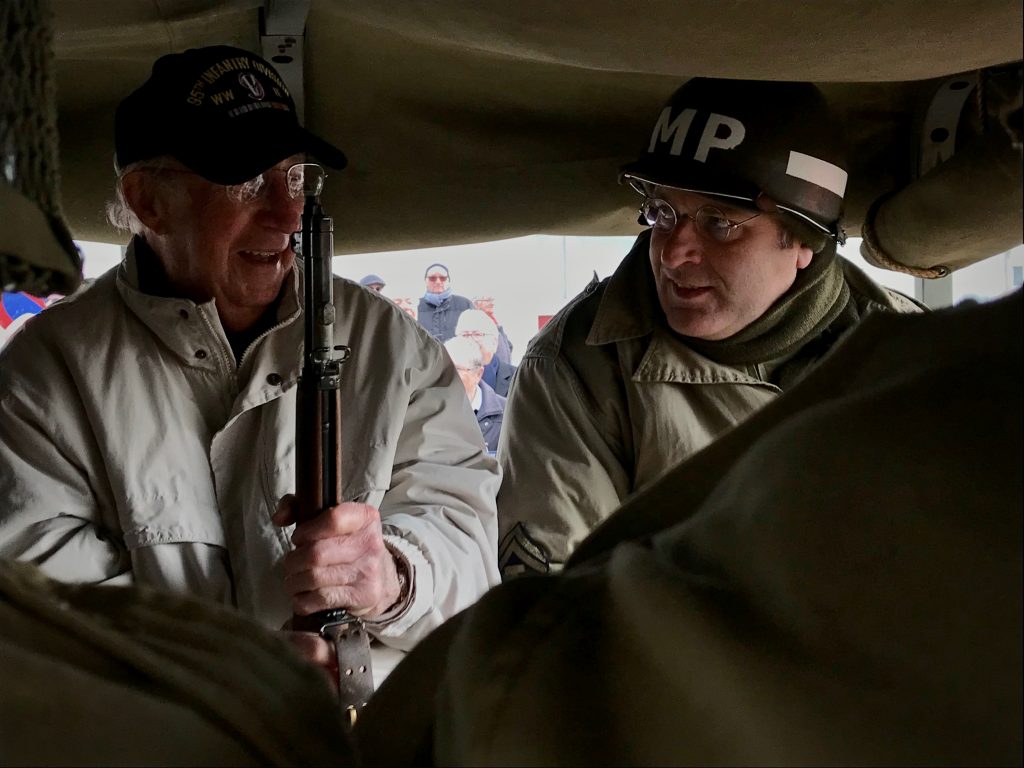
*
It became the 95th’s slogan: Les Hommes de fer de Metz. The Iron Men of Metz.
“You were a whole division,” the mayor of the Metz suburb of Woippy—Wappingen, until 1944—told the veterans. “You are three today. Three Iron Men who have crossed the Atlantic, so that we never forget your brothers who have fallen for France.”
The commemorations’ organizers had arranged receptions, parades, and exclusive museum and battlefield tours. There was a presentation by a direct descendant of the Marquis de Lafayette. There was a formal ball in Metz’s National Orchestra building. The veterans each displayed remarkable mobility on the dance floor, rocking and twirling daughters and nieces to the music of a local jazz trio. Bauer, in a 95th Division bolo tie, danced with the band’s singer, a dark-haired woman in a flowing purple evening gown.
A local group of reenactors ferried the veterans between events in green Jeeps and troop transports restored to exact World War II specifications. On a short trip into Germany, amid a wide backdrop of tidy farmland, the reenactors had erected a replica of a sign put up by the 95th 75 years earlier. YOU ARE NOW ENTERING GERMANY THRU COURTESY 95TH INF. DIV. Timed precisely for the moment of the Americans’ buses arrival, the reenactors trudged in double-file past the sign, as the veterans would have done once themselves. People cheered and some of them wept.
They stepped off their bus and once again crossed the border by foot. They used walkers and family members to help them across the uneven ground. The German farmer who had made his land available for the afternoon beamed.
Even with only three veterans, the American delegation was the largest ever to attend the ceremonies—eighty-six in all, between veterans’ extended families, friends, and the children and grandchildren of veterans who had died or were not healthy enough to travel. Bauer’s clan alone counted nineteen people from four generations.
Many in the American group had known each other for years, from past trips like this and from annual reunions put on by a legacy association dedicated to the 95th. Some carried with them keepsakes: dog tags, a folded uniform shirt, an old one-dollar bill with a father’s inked-on record of everywhere he traveled during the war. And at meals and on bus rides they excitedly traded in the encyclopedic minutiae of the 95th’s achievements. The mood was upbeat. But those who had been to Metz before observed a melancholy to the trip unlike during previous iterations of the ceremonies. “It’s more solemn this time,” Kimberlee Urbon, a niece of Bauer’s who has attended all the ceremonies since 2004, said. “I can really feel the absence of all the people who aren’t here.”
David Meyer, the man who cried out for Bauer to speak in Maizières, said the fact that this trip was likely to be the veterans’ last brought an urgency to the events. For going on two decades, Meyer, the son of Earl D. Meyer, an infantry radioman who died in 2003, has recorded interviews with the 95th’s veterans, which he edits and burns to CDs for their families, for posterity. The work, which often finds him juggling microphones and batteries, has made him a close watcher of people. “Everybody here is looking for something,” he observed. There were the proforma explanations for a trip to France—a desire to better understand a father or grandfather, say. But more complex motivations seemed to be revealing themselves this time around. “There’s a deeper level of things that people care about that normally are masked,” Meyer said. “Now, the masks are slipping.”
There was Jim Archer, for example, who led the American delegation in France. A retired two-star general who, as commander of the present-day 95th from 2004 to 2008, led reserve soldiers who deployed to Iraq and Afghanistan, Archer was easygoing and kind, both comfortable and humble with authority. He spoke frequently about the importance of remembering the World War II generation’s contribution, but over the course of the week it became clear there was more to it than that for him. “My father died when I was quite young,” Archer told a crowd at one reception, choking up slightly. “So, I’ve considered these men like another father to me.”
“I’ve never heard General Archer say anything like that,” Urbon remarked quietly, with awe, to those around her at the reception. “I’ve known him for years.”
Bauer, meanwhile, seemed at home in Lorraine. For a man once skeptical of too many visits there, he now spoke of the region in superlatives bordering on tall tale. Metz’s cathedral wasn’t just another Gothic church in Europe, it was “the world-famous Metz Cathedral.” And a liquor made from local plums, called Mirabelle, he hailed as the finest alcohol known to man. “When you drink it, it changes you,” he said in cheerful toasts of the drink. “You become like a god. … It is the greatest feeling in the world.”
Despite the short time Bauer spent in uniform, he described himself as “military to the core” and “devoted” to doing his duty, as he saw it, to impart as much as he could to as many people as he could about his brothers in arms. “For me, this is closure for the Iron Men of Metz,” he said. “I’m always looking for closure. That’s the name of the game.” Indeed, no microphone went untouched. And one-on-one, Bauer eagerly shared the story of the 95th with whosever’s attention he was able to snare, including hapless restaurant servers and, once, a Chinese aerospace engineer in the Metz hotel lobby. His smile was irrepressible.
“You know, I didn’t know Frank,” Bauer told Archer between events one day, speaking of the veteran Frank Taylor. “I’ve been talking to him. I’ve been telling him to be more aggressive in talking. I said, ‘Hey, get active. Get in there and go.’”
“Well, Ceo, you’re always the first one up,” Archer chided, suggesting that Bauer could perhaps leave more room for the other veterans to speak. Bauer laughed, and Archer continued: “Do you know what we called the first one up in the Army?”
“Stupid?” Bauer quipped. They both laughed.
“That’s not what I was going to say,” Archer said, smirking. “But perhaps that’s right.”
But Taylor, a retired physician from Virginia, had little interest in the limelight. It was enough to share the experience in France with two daughters, his son-in-law, and two grandsons.
Like so many World War II veterans, Taylor never cared to speak much about the war. With time, he found that many of the sights and sounds of the war had faded from memory. He could remember the fear he felt on the transport ship to Europe. He could remember the pain of losing his five best friends. And he knew that his field artillery battalion in the 95th fired over 200,000 rounds across German lines. But he didn’t really remember Lorraine. In 2016, Taylor by sheer happenstance met Archer’s brother in Charlottesville, who introduced him to Archer, who, in turn, encouraged Taylor to get involved with other veterans of the 95th. Taylor decided it was time, finally, to consider the war—and to pass on what he could to his family. “It’s kind of a closing of my life,” Taylor said, in a smooth Virginia drawl.
The November trip was Taylor’s first time in Lorraine since the war. Archer had warned him that he was in for star treatment, and he wasn’t wrong. On a chilly morning in the mining town of Créhange, amid parade music and hundreds of cheering onlookers, Taylor was hoisted and pushed onto the truck bed of a restored Dodge WC-52 troop carrier.
“I used to be able to jump into this sucker,” Taylor, now 96, said, laughing. A reenactor thrusted an M1 Garand into Taylor’s hands. It wasn’t the rifle Taylor carried during the war—he used a Carbine—but it would do for the moment. More reenactors piled aboard, and the truck rumbled forward, filling the air with wafts of diesel.
Later, in a gymnasium where the reenactors had set up a World War II reminiscent camp, townspeople clamored around Taylor. He responded almost bashfully. Nancy Atkins, one of his daughters, couldn’t quite believe her eyes. “I wish to God my kids were here,” she said. “I don’t think they get it. I don’t think I got it.”
A lanky, middle-aged man with facial scruff, was particularly eager to speak with Taylor. The man’s father had been unhappily conscripted into the German Army during the war and it was thanks to the 95th that his father was able to return to France and start a family. Taylor nodded. “You’ve just expressed something I’ve always wondered about,” he said.
“When you soldiers came to my village, we were German,” the man continued. He spoke passionately, as if from personal memory—it did not matter that he was not alive for the liberation. “Some of us had even been born German. But in our hearts, we were French.”
*
“We see it all one-dimensionally,” Billie Bauer, another niece of Ceo Bauer, said of the war. Her uncle had told plenty of stories over the years, she added.“But I didn’t really understand till we were here. You see the places, the people, and the lives they impacted. Until that, it’s just stories.”
In restaurants, people stood from their meals to introduce themselves to the veterans. In the Metz art museum, a young security guard with a braided ponytail left her post to snap pictures of the men on her phone. (“I’d never had anyone want to take a picture with me, before I came to France,” said Ceo Bauer. “I’d never been on TV. I’d never signed an autograph. Now, I’ve done all those things.”) A photographer hired to document the weeks’ events had taken a 10-hour English course to prepare for the veterans’ arrival. And a young man in his 30s, Mathieu Gitzhofer, whose knowledge of the 95th is encyclopedic, was on hand to help Americans in the group learn more about everything exactly that their fathers and grandfathers had done in the war.
Patricia Duno Sloss, one of Tony Duno’s daughters, was particularly taken when, one day, a young father approached to ask if his children could shake Duno’s hand. “And then he said,” Sloss recalled, “‘It’s very important to me that my children know what these men sacrificed.’” It struck Sloss that she couldn’t imagine most Americans doing the same. “He could have said, ‘Can I shake your dad’s hand? It’s important to me.’ But instead the message is about passing it on.”
France commemorates liberation elsewhere, of course, notably in Normandy and Paris. But for liberation to resonate so powerfully in Metz? Historians were not surprised.
“The liberation in Lorraine and Alsace has a very distinct flavor,” said Laird Boswell, a historian at the University of Wisconsin. In much of France the fighting was brutal but quick. In Lorraine it dragged on for months; some towns were not liberated until well into the spring of 1945. “So, not only have these people waited longer for liberation,” he said, “but they have suffered more.”
Some 100,000 people had escaped Lorraine or were expelled. Roughly 30,000 more were forcibly conscripted into the Wehrmacht and sent mostly to Germany’s eastern front to battle the Soviet Union. Some in Lorraine had resisted. Others still had collaborated with the Nazis, to an extent, Boswell suggests, that history still has not come fully to grips with. “There’s no other region in France that has that kind of history,” he said. Across post-war France men who had conscripted into the German Army wrote memoirs; that seldom happened in Lorraine. “You had lots of people who had lots of different experiences that were contradictory, that were hard to put together in some kind of coherent package.”
But the liberation itself was one event Lorrainers could agree upon. It required little examination of who had done what or was on whose side, of who resisted and who collaborated. In time, liberation narratives took on a life of their own. “It’s a great image, and there’s enough truth in it,” said Herrick Chapman, a historian at New York University. “By the time you get to the 80s and 90s, that romance has become part of the culture to a large degree.”
“I think as soon as I was able to understand history, I was told that American GIs liberated France and that we should be thankful,” said Lillian Borg, a long-serving secretary of Lorraine États-Unis, the organization which had helped organize the commemorations. “I learned this from my parents. We all did.”
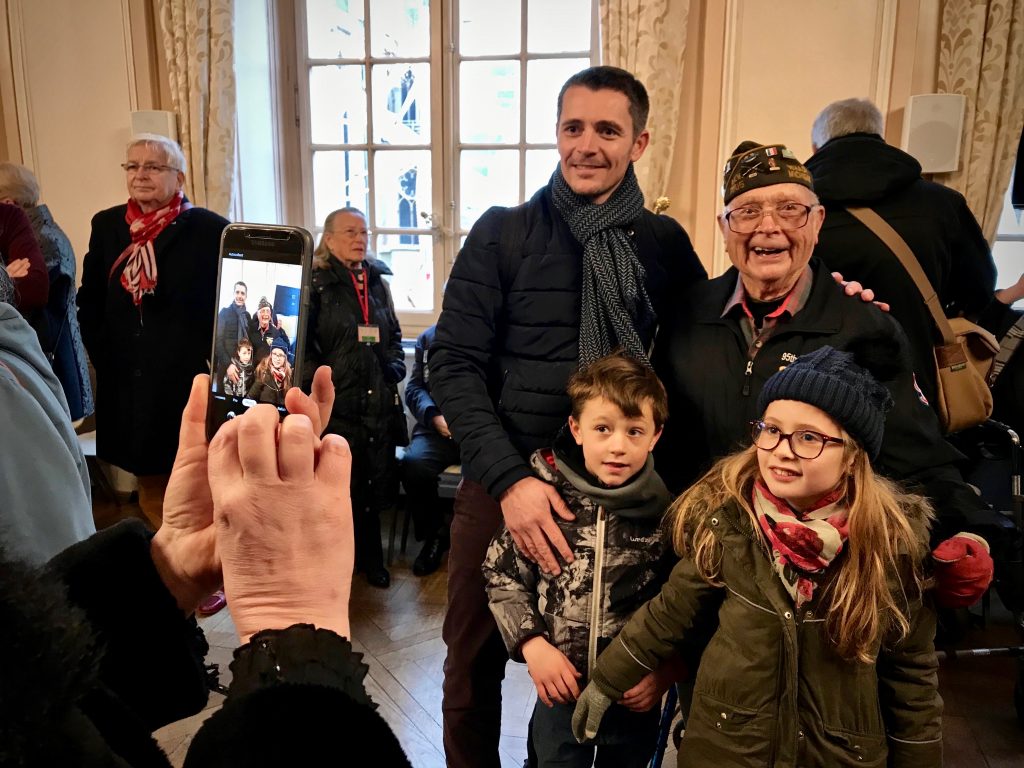
*
Seventy-five years ago, most of the 95th spent, all told, twelve hours in Metz. Then the men moved on, toward Germany. Along the way they liberated many more towns. Those other towns, while surely grateful, seldom hold similar commemorations, certainly not with the attention and fanfare of Metz.
That week in and around Metz there was a good deal of searching for meaning by the men and women who had come to Metz and for those who hosted them. There was talk of honor and valor and also of endings, considering that it was hard to imagine another commemoration that featured the very men who had fought to liberate Lorraine. The words came with thought and feeling and also with some struggle, as people tried to make sense of an event that logic suggested would have ended decades ago, as those who remembered the day died and their descendants lost interest. After all, they were only there for half a day.
Theo Muller, among the youngest of the French reenactors, at 18, spent four months on a French translation of a new book about the 95th, written by an American veteran’s son; copies of the translation were on sale at several of the week’s events. “We have to make and do things to show people how it was,” Muller said. “We cannot forget them.”
An American woman living in Metz found herself caught up in the commemoration, for reasons she had not anticipated. “These days, I’m not inspired by patriotic events,” she said. “I’m not proud of my country. I’m embarrassed. But around these men, I feel pride. I remember what we were and what we still can be in the world.
“I’ll leave here today with a boost. It was selfish. I came here to sort of fall back in love with the US.”
*
When Ceo Bauer returned to Michigan from that first trip back to Lorraine in 1985, he wrote a letter to Ronald Reagan.
“Dear Mr. President,” he began. “Recently my Army buddy and I traveled in Europe to the site where we were both wounded in World War II. … Later we visited Normandy and the American and German cemeteries there. At the German cemetery, I was deeply moved to forgive my enemies, and as a Christian have now done so.” He had also visited the Dachau concentration camp memorial, near Munich, Bauer wrote: “Again I was deeply moved, and indeed depressed, and felt that somehow I too had responsibility and blame for the tragic events that occurred there. Subsequently, I have asked my God for forgiveness.” Bauer urged Reagan to visit the cemeteries himself.
This letter, among many artifacts of Bauer’s World War II experience, is included in a personally written history of the 95th Division, ring-bound copies of which Bauer carried with him in a shoebox as gifts for the French in November. “I’m certain you’ll read it with great interest,” Bauer told one mayor during a reception. Some in the audience chuckled, because Bauer’s good-natured tone made him sound sarcastic. On reflection, it seems certain he was serious.
Typewritten first in 1947, Bauer updated his history over the decades with fellow veterans’ accounts of the war and, later, their correspondence with their new friends in Lorraine. For every moment of horror and danger in the history’s pages—memories of laying on a stretcher with tracer rounds flying overhead, bracing for a final impact for what never came—there is now an opposite moment of healing.
“Memories seem to mellow as time goes by,” Bauer wrote in conclusion. “I tend to forget the mean and sordid details and remember only the light and humorous incidents. Sometimes I catch myself with a grin on my face, saying, ‘I wouldn’t mind going back.’ I’m only kidding myself and those around me when I do so.”
At the liberation ceremony in Metz a crowd first gathered at the bald eagle monument. Later, in the city square many onlookers squeezed in around a fence set in place to cordon off the ceremony from an under-construction Ferris wheel for Metz’s annual Christmas market. It was cold, and the veterans were kept wrapped in gold foil blankets. French Army units paraded, and dozens of dignitaries filed through to thank each of the men personally and at length. “This is as cold as it was then,” Frank Taylor remarked, shaking. “I feel like I’ve been in combat this morning.”
Inside the city hall, in a wide and opulent ballroom with tall windows overlooking the incomplete Ferris wheel, the crowd was body-to-body. Speeches were given, and then it was Bauer’s turn to talk.
In the years after their return to Maizières-lès-Metz and the once-site of the Chateau Brieux, Bauer and Bodnar stayed in frequent touch with the men who had been their guides, Jean Luc Baudinet and Roger Goergen. In the 90s, veterans banded together to fly Goergen and his wife, Elizabeth, to the States for a reunion in Texas, and afterwards, Bauer drove them up to rural Michigan, where he showed them the farm he grew up on and introduced them to his family and friends. Whenever Bauer traveled to France, the Goergens were top on his list to visit. Roger Goergen died some years ago. But Elizabeth was there in the Metz ballroom.
From the microphone, Bauer spoke to her directly, thanking her for decades of friendship. He then urged the audience to see Elizabeth through his eyes. “Look at her,” he said, tearfully, taking in a dear friend for perhaps the last time. “She is so beautiful. Look at her.”
On the final evening in Metz, the Americans assembled in the hotel lobby for thank yous and warm goodbyes with their French hosts. There were exchanges of gifts—commemorative plates and military collectors’ coins from the Americans and specially-drawn lithographs and bottles of Mirabelle from the French. Everyone promised to stay in touch, as is necessary in such circumstances, but some seemed earnestly to mean it. That night, some in the American group would go to bars. Others would try out an already-open section of the Christmas Market, where amid sweets and toys and mulled wine one popular item on sale was, in fact, a newly released illustrated history of the 95th Infantry Division’s exploits in Lorraine.
A few Americans lingered in the lobby, snacking on cheese and bread, as the odd hotel guest passed by wondering at the commotion. Bauer was among the group, sitting on his walker and appearing, finally, a touch exhausted. “Viva la France, long live the USA,” he sang softly, aimlessly, while sipping Mirabelle. “Viva la France, long live the USA.”
He looked a man content in the life he had lived. “I came here for closure for me and my comrades,” he said. “Now, I’ve done my duty. I’ve done what I can in my lifetime.”
Andrew McCormick is an independent journalist in Washington, D.C. His work has appeared in The New York Times, The Atlantic, The Nation, and Columbia Journalism Review, among other publications. He is a US Navy veteran.
